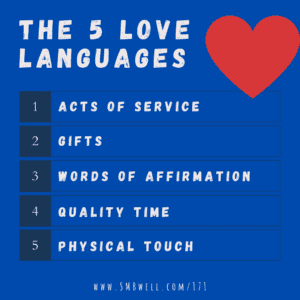Podcast: Play in new window | Download
Subscribe: Apple Podcasts | Spotify | Amazon Music | RSS | More
Five Love Languages
One of our basic human needs is to love and be loved. Today I bring you knowledge from Dr. Gary Chapman that has helped me in all the relationships that matter in my life. According to author Dr. Gary Chapman, there are five distinct ways we feel and experience love. Learning about these love languages helps us feel cared for, seen, and appreciated.
Its’ simplicity may make you skeptical yet I invite you to keep an open mind as it will help you feel more connected and less resentful. Listen in to the episode here and get ready to feel more connected and treasured.
Why should I learn about the 5 Love Languages?
First, learning about ourselves and our own needs and desires in any way is the foundation to a life well lived and feeling life satisfaction. Two things we’re all about here on the Love Your Life show. Therefore, at the very least, learn about your own love language to help you feel more loved and connected.
Second, I know my listeners lead full lives and love efficiency. Learning about the five love languages is hugely efficient! Research shows that most couples have different languages of love. Furthermore, we often express our love in our favored love language which can lead to disconnect and confusion.
Finally, please note that there is no right or wrong love language. Like everything we do here in SMB warrior world, accepting your and your loved ones’ preferences with a lens of compassion will go a long way. View this lesson as just that, a lesson. Our intent is to learn, become aware and gain understanding of self and others.
What are the 5 Love Languages?
As you read through these understand that you can feel connected and loved with all 5. What you’re looking for is your primary and possibly secondary language of love. I’ve included links at the end of this post for you and your loved ones to take the quizzes.
Words of Affirmation:
This love language is all about expressing affection through spoken words, praise, or appreciation. When this is someone’s primary love language, load them up with sincere compliments, authentic praise, and acknowledgement for their work.
If this is not your primary love language: setting a reminder on your phone to send a supportive text will serve you and your relationship well.
Physical Touch
A person with this love language feels loved through physical touch. They enjoy having their hand held, their arms touched, their back rubbed. Physical closeness feels like heaven. If this is an intimate relationship, then yes, this love language encompasses sex. Yet I need to note two things here: sex is not just sexual intercourse as we’ve learned from past podcasts with sex experts like Dr. Sonia Wright and Dr Alexandra Solomon. Use the whole menu of sexual acts to support this love lanugage.
Secondly, research shows that the frequency of physical contact is important to these partners, and unless you’re on your honeymoon…well you get what I’m saying. Making an effort to give small, regular touches throughout the day goes a long way. This lets them know you’re thinking of them, and how much you adore and appreciate them. A kiss on the cheek, touching his arm while he’s talking, a hug before her day starts.
If this is not your primary love language but it is your partner’s or child’s: build the habit of simple touch or hugging when you enter or exit each other’s space. Set time aside for a 5-minute back or foot rub once a week.
Quality Time
A person with quality time as their love language loves spending time with you. Duh, right? Yet, it’s important to note that the operative word here is QUALITY. This person doesn’t need you around 24/7, rather, focus on the quality of time when you are with them. Cell phone down. Eye contact. Active listening. Five minutes of time sitting with this persongoes a long way. They’ll feel deep connected when you give your undivided attention and connect in conversation.
If this is not your love language, use your calendar to schedule mini sessions of daily one on one time. This is one of my son’s primary love languages and I literally have on my calendar: “son time”. When that time arrives, I leave my phone in the other room and sit with him for 5-10 minutes. Golden phrases for this love language are “tell me more” or “what did you think about that”.
Good to know for us busy wives and moms, People with this love language are looking for quality over quantity. So, when you get together, they feel loved if you are present and focused on them. Great practice to make eye contact, affirm what they are saying, and refrain from offering advice.
Gifts
Someone with gifts as a primary love language views gifts as symbolic of love and affection. That said, it is not as straight forward as it seems. Gift-giving and receiving is one of the most misunderstood love languages as it’s rarely about the monetary value of a gift but rather about the thoughtfulness that the giver put into a present.
The love is felt based on the thoughtfulness and effort the gift giver put into the gift. They do not necessarily expect large or expensive gifts, the love language receiving gifts is more what is behind the gift that appeals to them. No need to break the bank here: the treasure is in the
If this is not your primary love language: Set some reminders to find some simple gifts to shower on your loved one. No need to wait for a special occasion or to break the bank. My husband will pick a flower from our yard and leave it on my desk or bring home the sample lotion from a hotel he was staying at and I feel loved and treasured.
Acts of service
The final love language is acts of service. An individual who receives love this way equates affection and love with help. They appreciate gestures that demonstrate love in clear, concrete ways. They love it when you offer useful actions.
Cleaning the kitchen after dinner, giving you a ride to the airport, fixing their broken necklace: these acts of service go straight to the person’s heart. These people love when others do little things for them and therefore, they can often be found doing little things for others.
If this your partners love language and not yours, one winning tip here is to ask them what household task is their least favorite and then boom, surprise them this week by doing it.
Two Common Questions about the 5 Love Languages
I recently put a poll out on instagram asking if anyone had questions about the 5 love languages and I wanted to answer the two top questions that came up again and again:
What happens if you have a different love language than your partner?
This is very very common. Research shows that the likelihood that your partner’s love language is the same as yours is unklikely. Which is why resentment and frustration builds. Why? How? Imagine this scenario:
Say your primary language is gift giving and your husband’s is physical touch but either you haven’t heard about love languages or communicated what yours were. He comes back from a boys’ weekend and hugs you and touches you and kisses you. You’ve spent all weekend with the kids and the last thing you want is to be touched by another human. You shrug him off and physically distance yourself. His mind consciously or unconsciously goes to “alert! Problem!” And may be a bit like: wtf? You feel disconnected and unappreciated.
Now imagine this alternative scenario where you know what your love languages are:
Your husband walks in the door after his boys’ weekend with a bag of specialty tea from where he was traveling… just for you. As you melt, you remember his love language and lean in for a long hug and squeeze. What a different start. Not massive or significant but a whole lot more connected than past interactions.
How do you find out your partner, kids, or friends love languages?
The easiest way is to send them the links below to take the 5 minute quiz. I like to preface it by saying it’s all about them. Saying something about how I want to better support and love them and learning their results from this quiz would help me.
If they’re not into it, no worries: observation is huge here. Knowing that one gives love in the way they like to receive love is a big hint. Does your sister always send verbose, carefully crafted letters and cards? Bet she’s a words of affirmation. Does your son bring you back a leaf when he’s at a playdate? Think gift giving. Does your husband wash your car, straighten your running gear, or fill up your nightly water cup? Acts of service.
Links Mentioned:
Become a Patreon of the Love Your Life Show







